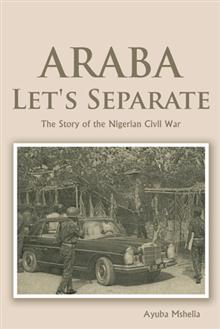Title: Araba Let’s Separate: The Story of the Nigerian Civil War
Author: Avuba Mshelia
Publisher: AuthorHouse
ISBN: 978-1468524277
Pages: 308, Paperback/Kindle
Genre: Historical Fiction
Reviewed by: James Sadler, Pacific Book Review
Book Review
The title Araba, a word meaning “Let’s Separate” or “Let’s Dissolve,” refers to the Nigerian Civil War which began in 1966 and continued for nearly four years. The word was first used by rioters at a demonstration in the early stages of the civil war, in an attempt to signal their dissatisfaction with attempts to unify Nigeria under what was known as “Decree Number 34.”Professor Mshelia has fashioned the events of that period into a something of a historical novel, mixing in fictional characters, and in some cases battles and confrontations, with the historical characters and actions that were a part of that war. In Preface One to the book, Professor Mshelia states that he took this approach as “an attempt to present history in a fictional form for an easy and interesting reading for the general public.”
It rests upon the reader to determine what is historical fact and what is fiction. Given his statement that the book contains fictional elements, this would normally not appear to be a problem, however, in this instance it sometimes results in confusing the reader.
That’s not to say that Araba doesn’t make for an interesting read. Prior to reading this book, I was completely unaware of the events recounted in the book. And as someone who enjoys history, I’m somewhat ashamed to say that, although I’m certainly not alone among Westerners in that regard.
So Professor Mshelia is due praise for attempting to bring these events to light, although I wish he had decided to avoid adding any fictional elements in an attempt to make the book more accessible and readable.
This book Araba Let’s Separate limits its scope to one single but important event in the life of the nation. The event is on January 15th of the year 1966, an attempted coup d’état led to the assassinations of a number of prominent northern political leaders, including the then-Prime Minister of Nigeria, Sir Abubakar Tafawa Balewa.
Those assignations were the catalyst for the civil war, and the thousands of deaths that resulted, as the civil war turned into an attempt at secession and to carve out a separate “Republic of Biafra” from the Federal Republic of Nigeria.
Araba Let’s Separate: The Story of the Nigerian Civil War is packed with detail, as well as informative commentary—some of which is true and some narratives added for clarity, this is a work of fiction and fact. Regardless, it is a worthwhile read, particularly for history buffs like me, probably needing to know more about these important events in Nigerian history.


